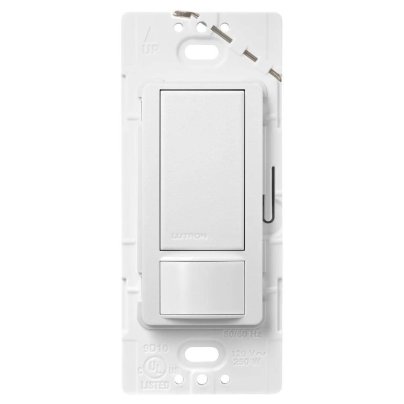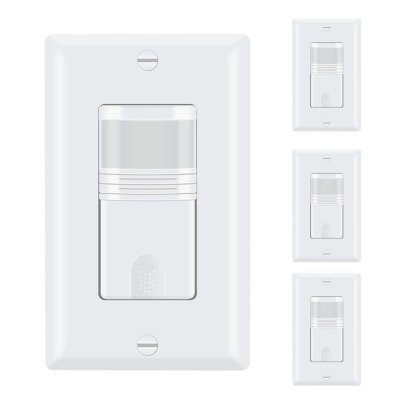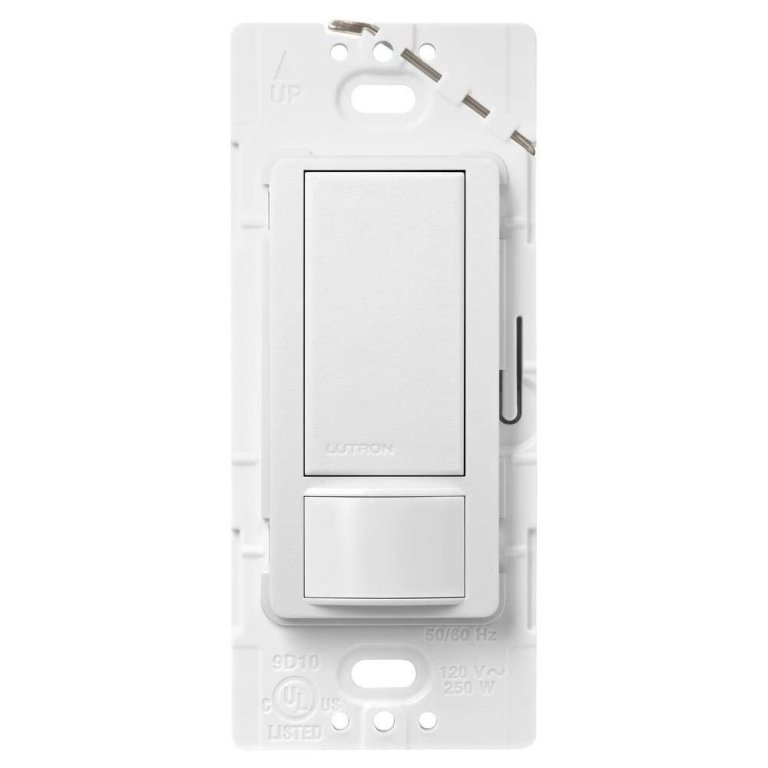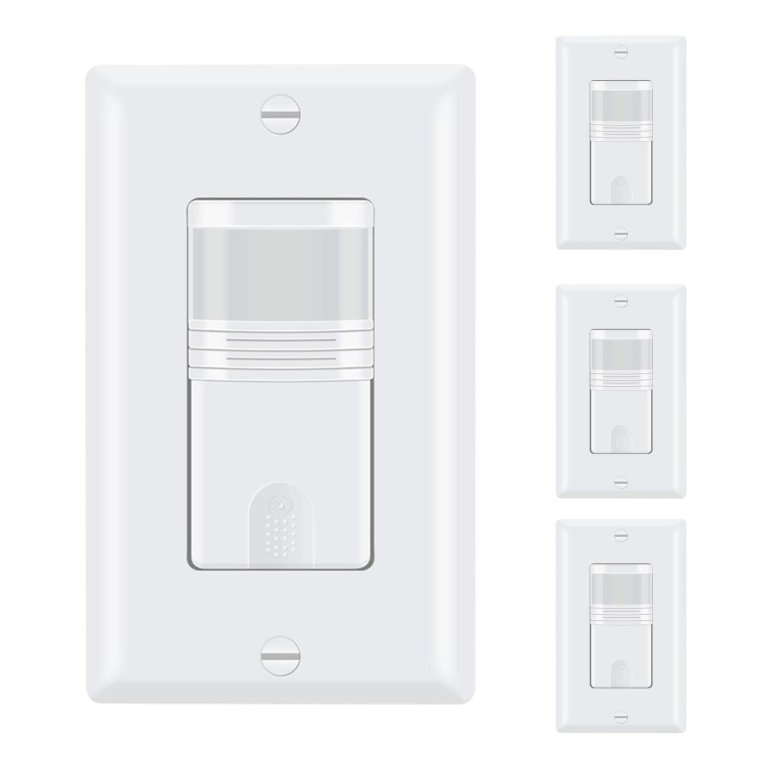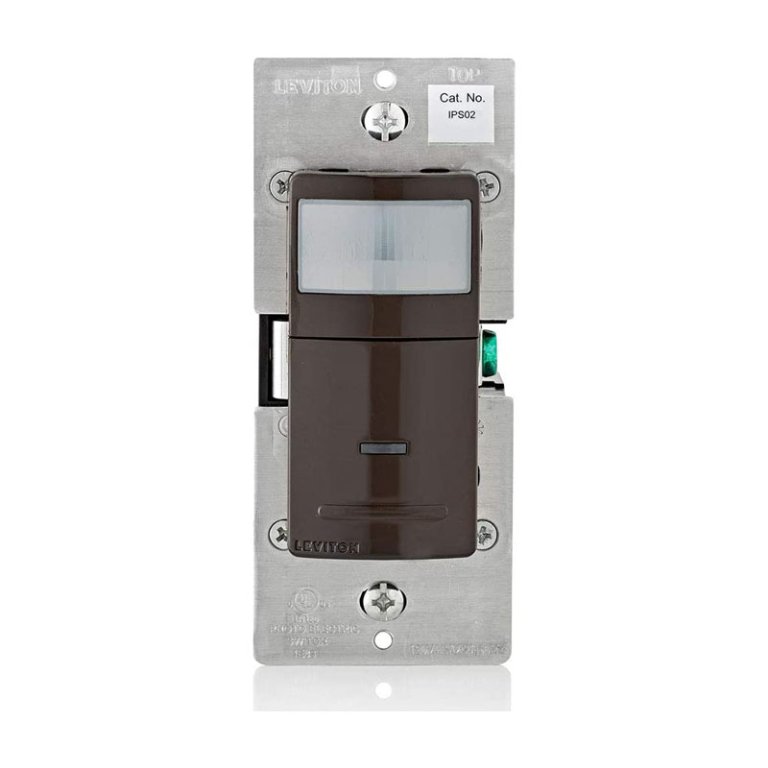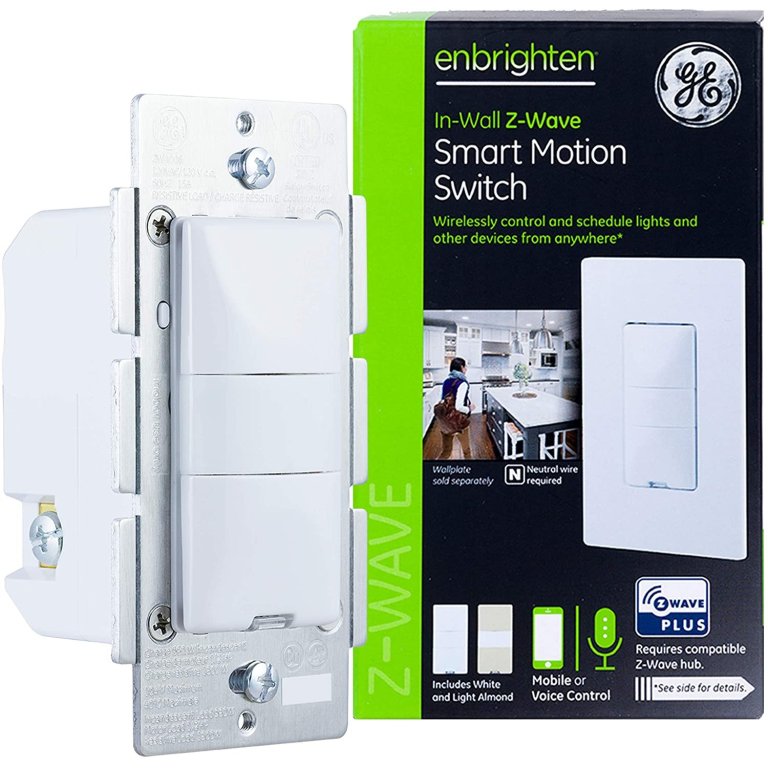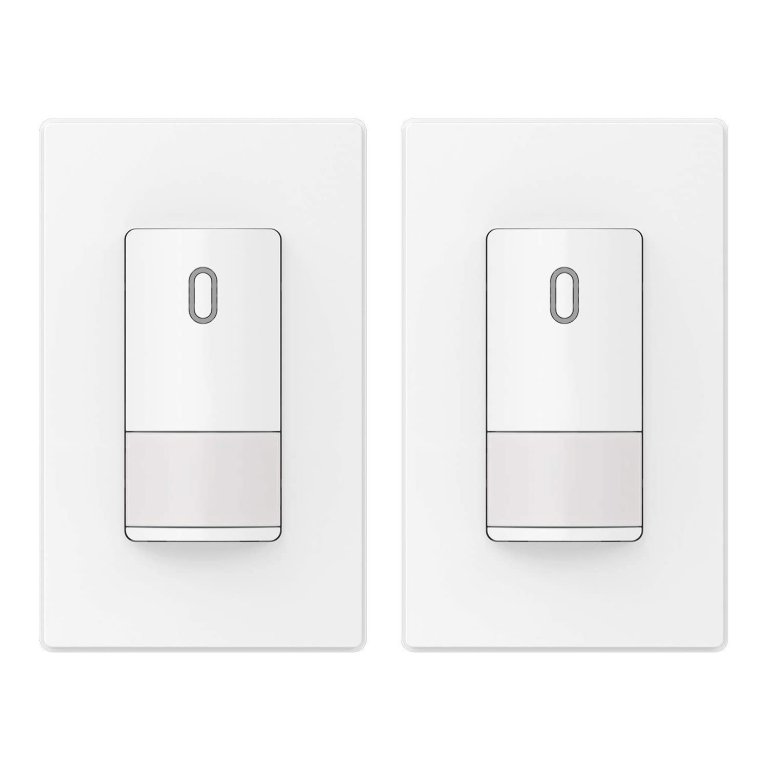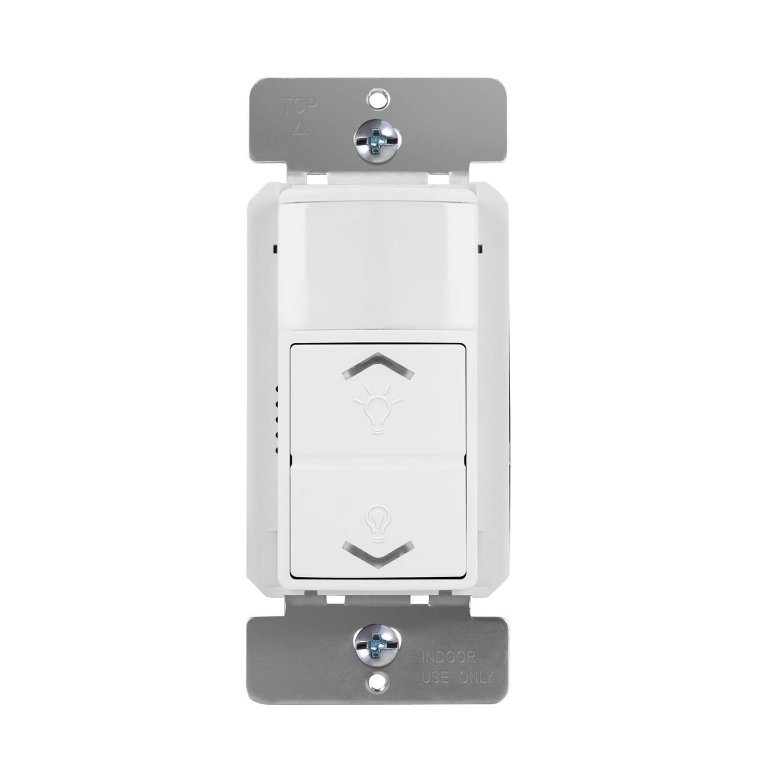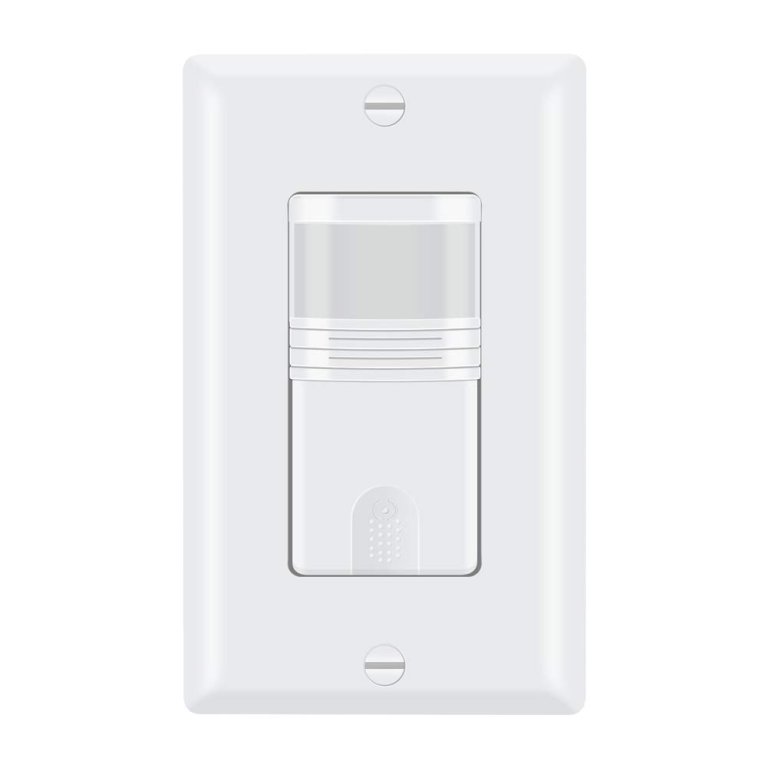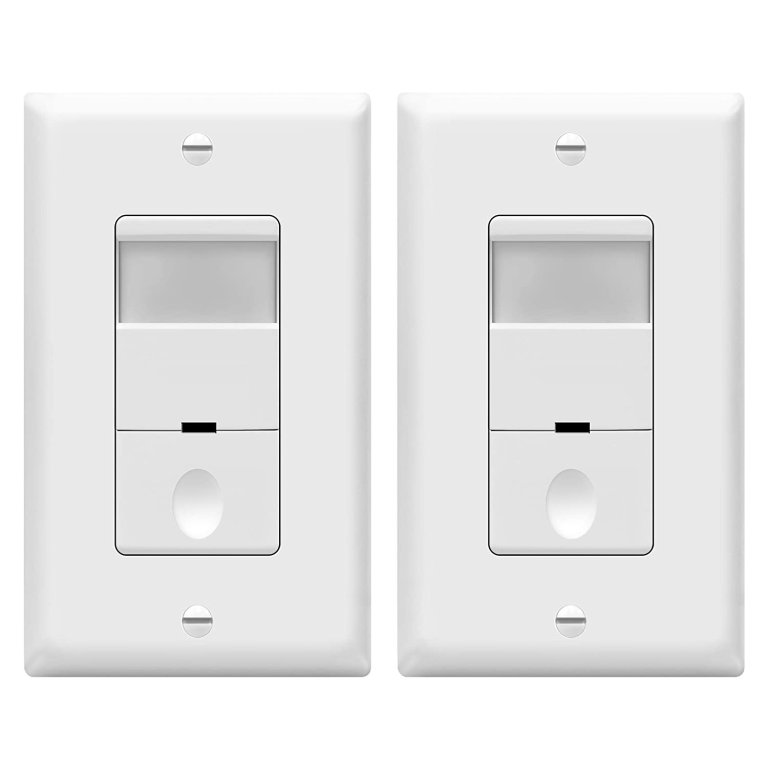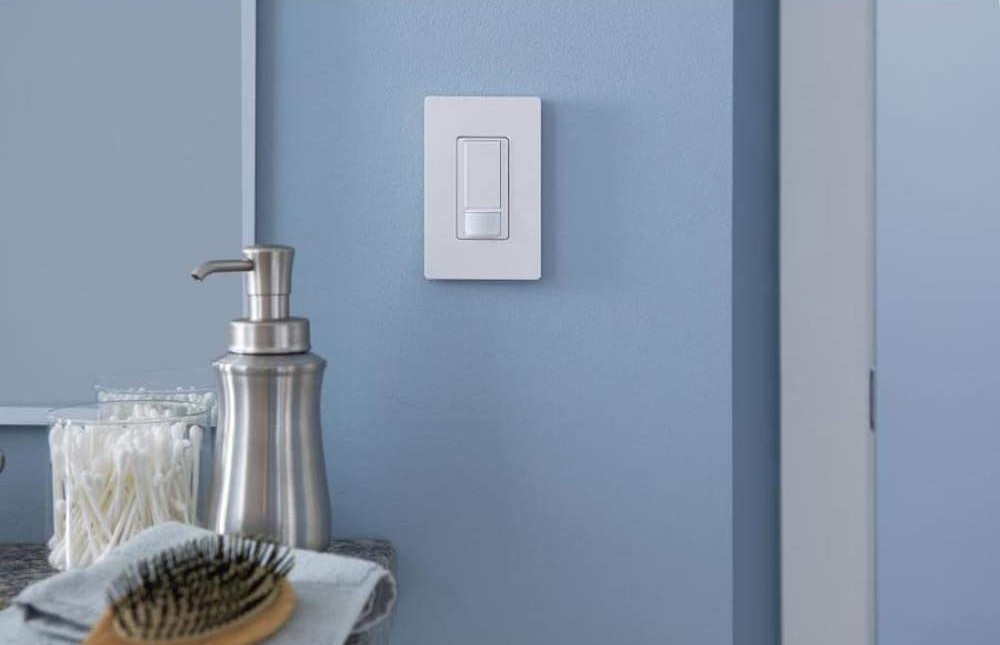
We may earn revenue from the products available on this page and participate in affiliate programs. Learn More ›
For those who forget to turn lights off, a motion sensor light switch offers an excellent solution for empty rooms that always seem to be illuminated—even when no one is in them.
Motion sensor light switches detect motion or body heat, turning on the light when a person enters and turning it off after the person exits. Plus, most DIYers can trade out an old light switch with a motion sensor light switch with just a few simple tools.
This guide will examine the essential factors to consider when shopping for the best motion sensor switch and identify some of the top models on the market.
- BEST OVERALL: Lutron Maestro Motion Sensor Switch
- BEST BANG FOR THE BUCK: ECOELER Motion Sensor Light Switch
- BEST MOTION SENSOR: Leviton IPS02-1LB Decora Motion Sensor In-Wall Switch
- BEST SMART: GE Enbrighten Z-Wave Plus Smart Motion Sensor Switch
- BEST CUSTOMIZABLE: ELEGRP Occupancy Sensor Light Switch
- BEST WITH DIMMER: TOPGREENER PIR Motion Sensor with Dimmer Light Switch
- BEST THREE-WAY: ECOELER 3 Way Motion Sensor Light Switch
- BEST VERSATILE: TOPGREENER TDOS5-W-2PCS Motion Sensor Light Switch
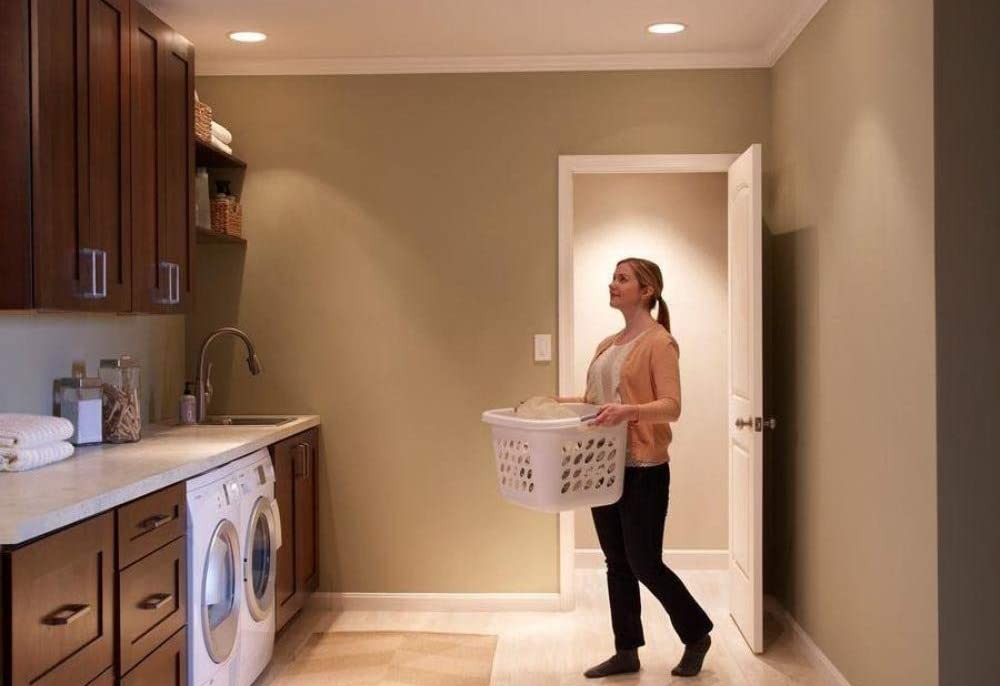
What to Consider When Choosing the Best Motion Sensor Light Switch
Though a motion sensor light switch performs the simple task of turning on or off the lights in a room, there are a surprising number of factors to consider when shopping for one. Ahead, learn about the two distinct types, the difference between active and passive sensors, and other critical characteristics of these convenient electrical devices.
Occupancy vs. Vacancy
Motion sensor light switches are available in occupancy and vacancy types, with many functioning as both types.
- Occupancy light switches turn on the light when a person enters the room and then turn it off a set amount of time after they leave.
- Vacancy light switches do not turn the light on when a person enters, requiring them to turn it on manually. However, vacancy light switches automatically turn off the light after the room has been unoccupied for a certain period of time.
Although vacancy light switches may not be quite as convenient, they are more energy efficient as the user may often not need artificial light in a room when there is enough natural light from windows. Occupancy light switches, in comparison, will turn on the light regardless of the brightness level in the room, unless they have a light sensor.
Active vs. Passive Sensor
Motion sensor light switches use one of two sensors to detect occupancy in a room: passive and active.
- An active sensor sends out sound waves that bounce off people and objects in the room and then returns them to the switch. If the returning waves identify a change in the pattern of the objects in the room—because someone has entered or is moving in the room—the sensor triggers the switch that turns on the light. If the sensor doesn’t recognize any changes over a certain length of time, it turns off the light.
- A passive sensor detects heat given off by people and animals. If the sensor detects heat, it triggers the switch to turn on. If the sensor detects no body heat after a certain amount of time, it triggers the switch to turn off. To avoid accidental triggers from sunlight, the sensor’s sensitivity allows it to ignore gradual changes in heat.
Extra Functions
Motion sensor light switches include extra functions that allow the user to customize how they work.
- Daylight sensing: Sensors assess the level of ambient lighting in the room and turn the lights on or off based on that level. If the sensor detects that the room is already bright enough, it will not turn on the lights. Daylight sensors have dials that let the user customize the sensitivity.
- Dimming: Most motion sensor lights do not function as dimmers. There are, however, specialty models with dimmer capability. These switches feature a motion detector and a paddle switch that controls the dimming.
- Motion sensitivity: Many motion sensor light switches offer sensitivity settings that permit the user to fine-tune the level of movement that triggers the light.
- Smart technology: Smart motion sensor light switches connect to a home’s smart hub, allowing the user to control the lights, create lighting scenes, program schedules, and change the sensitivity settings via a smartphone.
Light Bulb Compatibility
Motion sensor light switches can handle a significant amount of wattage. Most have a capacity of up to 500 watts for incandescent bulbs and 250 watts for LED and CFL bulbs, which is far greater than any individual light bulb. This may be a vital feature to consider if the switch operates a light fixture that uses multiple light bulbs. A kitchen light fixture that uses six 60-watt incandescent bulbs, for example, would require a light switch with a capacity greater than 360 watts.
Wiring and Installation
When taking the proper safety precautions, replacing a standard light switch with a motion sensor light switch is a project most DIYers can complete in less than 30 minutes. No special tools are required, although it’s a good idea to purchase a voltage detector—an inexpensive device that detects if a wire is live—for safety purposes.
Most light switch installations require only a standard Phillips-head screwdriver and a flathead screwdriver. Single-pole light switches have two wires and a ground wire. A hot wire, which comes from the home’s power source, connects to one of the switch’s terminals. A second wire, which goes to the light fixture, connects to the other terminal. A copper wire that serves as the grounding wire connects to a third terminal, which prevents the light switch from shorting out during a power surge.
Our Top Picks
These top picks narrow the field to some of the best motion sensor switches on the market. These switches feature numerous settings that allow the user to fine-tune sensitivity, adjust vacancy and occupancy settings, and set time delays. Some are compatible with three-way switches and dimmers, while others can connect to smart devices.
Best Overall
Lutron Maestro Motion Sensor Switch
Pros
- Can detect visible motion as small as typing at a desk
- Won’t turn on in full daylight
- Programmable timer up to 30 minutes
- Manual and automatic use
Cons
- Installation might be a challenge
Product Specs
- Type: Occupancy
- Active vs Passive: Active
- Ease of Installation: Easy
An inaccurate motion sensor light either leaves a person in the dark or leaves an unoccupied room fully lit. Lutron’s advanced motion sensor technology is what sets this switch apart from much of the competition. Its XCT sensing technology is sensitive enough to detect the small motions characteristic of typing at a desk or reading. The switch also can sense ambient lighting, helping save energy when there is already enough natural light in the room.
Other thoughtful features include a programmable time-out that turns off the lights after 1, 5, 15, or 30 minutes of no movement in the room. This switch features a streamlined look and comes in 25 finishes, making it easy to match with the decor of just about any room. The Maestro Sensor Switch is a single-pole, so it’s only compatible with light fixtures controlled by a single switch.
Get the Lutron switch on Amazon, The Home Depot (2-pack), and Ace Hardware.
Best Bang For The Buck
ECOELER Motion Sensor Light Switch
Pros
- Adjustable timer, sensitivity, and light detection
- Manual and automatic use available
- Pack of four
Cons
- Might not detect floor movement well
Product Specs
- Type: Occupancy and vacancy
- Active vs Passive: Passive
- Ease of Installation: Moderate
With its inexpensive per unit price, this pack of four light switches from ECOELER is a great option for those looking to trade out multiple switches in a home. And despite the low cost, these switches offer more customizable functions than most higher-priced motion sensor light switches. Among these useful settings are an adjustable time delay that sets the time between when the sensor picks up motion to when it turns off the light to 15 seconds and 1, 5, 15, and 30 minutes.
An occupancy function serves as an override that prevents the light from turning off, while a vacancy function saves energy by requiring the user to turn on the light manually when entering the room. These switches are compatible with light fixtures that work with a single light switch and come in a white finish.
Get the ECOELER light switch on Amazon.
Best Motion Sensor
Leviton IPS02-1LW Decora Motion Sensor In-Wall Switch
Pros
- No neutral wire required for installation
- Covers up to 900 square feet
- Daylight sensor adjusts to natural lighting
Cons
- Some units seem to cycle on and off
Product Specs
- Type: Occupancy and vacancy
- Active vs Passive: Passive
- Ease of Installation: Moderate
One of the nicest features of this motion sensor light switch from Leviton is its versatility. The switch will turn on the light when it senses motion when in occupancy mode or will require the user to manually turn on the light when in vacancy mode. This feature saves energy by keeping the lights off when natural light conditions are sufficient.
The time delay for the auto-off feature is also programmable from 30 seconds to 30 minutes. With its 180-degree field of vision and ability to cover up to 900 square feet, this switch is ideal for larger rooms. It is compatible with light fixtures that connect to a single light switch and available in white, brown, gray, and almond finishes.
Get the Leviton switch on Amazon.
Best Smart
GE Enbrighten Z-Wave Plus Smart Motion Sensor Switch
Pros
- Optional voice control with any Z-Wave–certified hub
- Manual or automatic sensors
- Motion sensors can be adjusted for better detection
- Detects up to 45 feet away
Cons
- Timer seems to override manual controls sometimes
Product Specs
- Type: Occupancy and vacancy
- Active vs Passive: Active
- Ease of Installation: Moderate
Smart capability, a host of control options, and its ability to work with fixtures controlled by multiple switches make this motion sensor light switch from GE one of the most technologically advanced ways of controlling the lights in a home. When connected to a Z-Wave hub, this smart motion sensor works with a variety of smart home hubs, including ADT, Ring, Trane, and Vera, as well as personal assistants like Amazon Alexa and Google Assistant. The user can operate the lights via a smart device or voice control, set custom scenes with other smart switches, schedule lights, and even send alerts.
While most switches are limited to light fixtures operated by a single switch, this model works with fixtures that use two or three switches, making it ideal for kitchens and living rooms. The user can also set motion-detection options for occupancy, vacancy, or full manual with time-out settings ranging from 5 seconds to 30 minutes. Both white and light-almond paddles are included.
Get the GE Enbrighten sensor light on Amazon.
Best Customizable
ELEGRP Occupancy Sensor Light Switch
Pros
- No neutral wire means it could work in older homes
- Detects movement up to 35 feet in front of switch
- Adjustable timer, sensitivity, and light detection
Cons
- Side and floor sensors are limited
Product Specs
- Type: Occupancy and vacancy
- Active vs Passive: Passive
- Ease of Installation: Easy
Being able to customize the settings of an occupancy sensor light switch is key to making sure the lights turn on when they’re needed and stay off when they’re not. To do that, a sensor light switch must be able to assess the light conditions in the room. Each light switch in this two-pack from ELEGRP features three occupancy modes that allow the user to set the light conditions for when lights will turn on, helping to save energy by keeping them off when not required.
These motion sensor light switches function as occupancy sensors, turning on automatically when a person enters the room but shutting off after a set amount of time when the space is unoccupied. Like other motion sensor switches, this model permits the user to set the shut-off delay from 30 seconds to 30 minutes. They come in a matte white finish.
Get the ELEGRP light switch on Amazon, The Home Depot, and Wayfair.
Best With Dimmer
TOPGREENER PIR Motion Sensor with Dimmer Light Switch
Pros
- Dimmer controls to adjust brightness
- Could cover up to 1,200 square feet
- Manual and automatic use
Cons
- Heat sources could cause light to turn on
Product Specs
- Type: Occupancy and vacancy
- Active vs Passive: Passive
- Ease of Installation: Easy
With its integrated dimmer and compatibility with light fixtures with multiple switches, this motion sensor light switch from TOPGREENER is ideal for rooms with chandeliers and other large fixtures, such as kitchens and dining rooms.
The switch’s functions are similar to other infrared sensor switches, using body heat to trigger the lights to turn on and off after a set amount of time, from 15 seconds to 30 minutes. A paddle-style switch with convenient LED arrows allows the user to dim the light levels manually. The lights then conveniently remain at that level when the switch turns off and on. With its 1,200-square-foot coverage, this switch is also well suited to handle larger rooms. It comes in a white finish.
Get the TOPGREENER PIR light switch on Amazon.
Best Three Way
ECOELER 3 Way Motion Sensor Light Switch
Pros
- Three-way light switch
- Adjustable timer, sensitivity, and light detection
- Automatic and manual use
Cons
- Hard to program between 5 seconds and 5 minutes
- Paper instructions aren’t accurate
Product Specs
- Type: Occupancy and vacancy
- Active vs Passive: Active
- Ease of Installation: Moderate
Rooms such as kitchens and larger living rooms with light fixtures controlled by multiple switches necessarily require switches with three-pole wiring capability. This model from ECOELER is one of the best options. In addition to three-way wiring, numerous modes permit the user to customize this switch to suit various lighting needs.
The user can toggle between both automatic and manual “on” modes and automatic and manual “off” modes. The adjustable time delay boasts a wide range of settings from 15 seconds to 30 minutes and dials that adjust light and motion sensitivity offer a high level of customization.
Get the ECOELER 3 Way light switch on Amazon.
Best Versatile
TOPGREENER TDOS5-W-2PCS Motion Sensor Light Switch
Pros
- Passive infrared sensor resists false triggers
- Occupancy and vacancy mode switch
- Adjustable timer and range
- Pack of two
Cons
- Manual shutoff does not reset timer which prevents turning on
With its broad range of color options, this set of two motion sensor light switches will pair with a variety of different room decors. Available in white, ivory, light almond, gray, brown, and black, these switches also feature plenty of function to go with their form. Each switch offers several operating modes, including vacancy—which doesn’t turn the light on but automatically turns it off—and occupancy that automatically turns the light on and off.
These switches also allow the user to set programmable time delays that range from 15 seconds to 30 minutes. They are single-pole switches, making them compatible with light fixtures controlled by one switch.
Get the TOPGREENER light switch on Amazon.
Our Verdict
We chose the Lutron Maestro Switch as our favorite pick since it has high-motion sensitivity and several adjustable options. It also comes in several color options to suit many color palettes. Alternatively, for a budget-friendly option, the ECOELER light switch comes with occupancy and vacancy settings, comes with adjustable timers, and can be programmed to run automatically or manually.
How We Chose the Best Motion Sensor Light Switches
These recommendations include the basic features expected of most motion sensor light switches: adjustable settings, automatic and manual modes, and compatibility with most common lights or fans. Their ability to detect motion relies on unobstructed detection access to movement or heat sources, so there are varying degrees of effectiveness based on the room they’re installed in. However, we included products that work in smaller rooms or rooms up to 1,200 square feet.
Our favorites have options to purchase a single unit or multiples if you have several rooms that need motion sensor light switches. Additional features we reviewed included dimming capabilities, daylight sensing, and smart technology compatibility. Some products we reviewed can be installed without a neutral wire, which makes them suitable for older homes, and others have stricter installation requirements to meet current building codes.
FAQs
If you’re still wondering about how a motion sensor light switch works or if it is a cost-effective option, then read on for answers to these and other common questions.
Q: What is a PIR switch?
PIR stands for passive infrared. Unlike a motion sensor, which turns a light on and off when it identifies motion, a PIR switch detects the heat created by people and animals. When a PIR switch detects heat, it turns on the light. When the switch no longer detects heat, it turns off the light based on the set time delay.
Q: Can I put a motion sensor on a three-way switch?
A motion sensor will work on a three-way switch; however, the motion sensor light switch must be a three-way switch. It is not possible to wire a single-pole switch to a light controlled by two or more fixtures.
Q: Do motion sensor light switches save money?
Motion sensor light switches can save money in rooms that receive low to medium traffic, such as closets, guest rooms, bathrooms, and storage rooms, by turning off lights that one might otherwise unnecessarily leave on. They aren’t as effective for high-traffic rooms in which frequently switching the light on and off can actually be less energy efficient.
Q: Why does my motion sensor light stay on all the time?
This is most likely due to the occupancy mode on the switch. Many motion sensor light switches have an occupancy mode that the user can turn on or off. If the occupancy mode is on, the light will turn off according to the delay time set on the switch. If the occupancy mode is off, the light will remain on indefinitely.
Q: How do I keep my motion sensor lights off all the time?
Most motion sensor light switches have an override feature that allows the user to disable the auto-on features for the light. Disable the auto-on feature by switching it to the “off” position.
